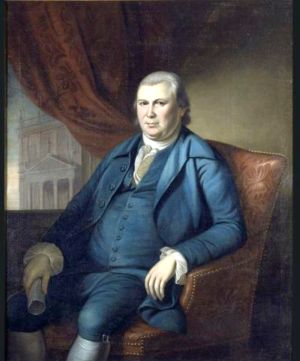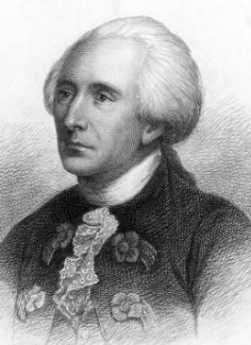Related Topics
Robert Morris: The Dark Side
The richest man in America suddenly was locked in debtor's prison, $12 million in debt. While in prison, he reduced that to $3 million, and got released under a new bankruptcy law he helped devise.
Robert Morris and the Lee Brothers
* * *
Morris was a monarchist, announcing he liked the king and did not want to change him. The Lees, one surmises, though they might make pretty good kings, themselves.
But we get far ahead of the story. The immediate mystery is Morris' behavior in July, 1776.

|
| Robert Morris |
The dominant feeling during 1775 had been that Americans needed to prepare for war while doing everything possible to avert it. If England prevented both the manufacture and importation of gunpowder in the colonies, there was no way to be prepared for war except to smuggle gunpowder. Not to smuggle it would leave the colonies weak, almost inviting abuse from London. In several elections, before then Morris had been the nominee of both the radicals and the conservatives. The radicals could see he was an energetic, efficient and close-mouthed international shipowner; when a Secret Committee was proposed, he obviously would be an effective member of it. But he was loudly opposed to war with England and was formidable in a debate. The conservatives might have felt he would keep the hotheads on the committee from wandering from or expanding its narrow charge. He explained his dual position as seeking "Constitutional Liberty" rather than independence, but that was shrugged off as just so much blather. It would be twelve years before people did understand what he wanted, and that he was entirely serious about it. That the Lee brothers didn't ever understand, didn't bother Morris at all. That the Lee brothers couldn't comprehend his unwillingness to charge headlong into battle, unarmed and unprepared, was equally mysterious to Morris. The Lee brothers would well have understood Napoleon's remark that victory was 10% based on surprise. But what Napoleon is thought to have said was that victory was 90% based on supplies.

|
| Arthur Lee |
The later appointment of Arthur Lee to the Secret Committee can be similarly explained as a counterbalance to Morris. There were no Southerners on the initial committee, so a hothead like Arthur Lee could be counted on to resist the influence of conservative merchants and perhaps Arthur, outnumbered, was even urged to overplay his hand. From the moment he was appointed, he was demanding that Benjamin Franklin be removed from the committee. Not only does this help us understand his disruptive behavior when he later joined Franklin at the Paris negotiations, but such misjudgment of Franklin's patriotism illustrates how extreme Lee's suspicions really were. Since the original motion for independence had been introduced in Congress as the Virginia Resolution by his brother Richard Henry Lee, we sense this family was perpetually anxious to slay dragons. And finally, we can sense the likelihood that Robert Morris and Arthur Lee probably provoked each other.

|
| Richard Henery Lee |
To tolerate for the moment the rather extreme Lee brothers, it must be said there was every reason to suppose Morris hoped to enrich himself from gun running. But that is an entirely different accusation with a different defense. The ambivalent behavior of Morris and Dickinson at the Congress is admittedly puzzling, but in the end, defensible and honorable. The accusation of graft and self-dealing was plausible for uncomprehending people but seems legitimate today only because American standards of leadership ethics have gravitated toward the Virginia viewpoint. That viewpoint can be summarized by George Washington refusing to accept a cent for his years of public service. Very few politicians will today tell you this is a practical position, but nevertheless, many Americans wish it could be. Lacking any insight into what Morris was talking about with "Constitutional Liberty", the Lees were perhaps understandably driven to invent plausible explanations. These seldom proved to be fair. Morris certainly had the sympathy of the commercial world at the time for what was to them quite normal behavior. However, the rural population, especially Cavalier Tidewater Virginians, will probably never yield the point.
Morris repeatedly advised his partners he was serving his nation, while of course engaging in private profit. Even using present standards about self-dealing, it must be admitted the need for secrecy at the time necessitated hiding the smuggling within legitimate businesses. Nowadays we throw people out of a public office on suspicion of enriching themselves and throw them into jail on clear proof of it. There is also a curious feature of extreme mindsets, which seems to justify making false accusations. The underlying theory is that behind every great fortune is a great crime, so you might as well hang him for it without further proof. Morris would have been astonished at the thought of taking such risks without hope of restitution: "Do you want me to smuggle this stuff or don't you?" might well have been his answer.
And then there were those two aristocratic Frenchmen, Penet and Pliage, appearing in Providence RI in a boat loaded with gunpowder, looking for George Washington to sell it to. Everyone at the time assumed they were just adventurers, out for the money. After the passage of two centuries, it may be within bounds to ask the French to look into their records to see if maybe P&P were sent here to stir up a little trouble? There proves to be quite a literature about them, linked to that glamorous Renaissance Man, Beaumarchais.
Originally published: Friday, April 15, 2011; most-recently modified: Tuesday, June 04, 2019